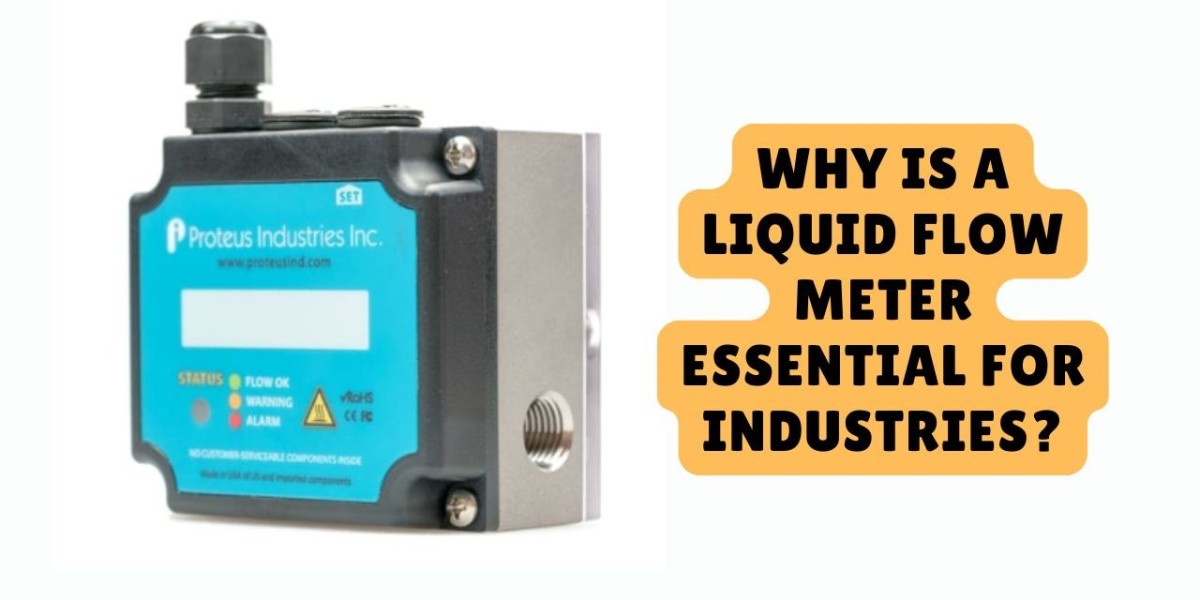A liquid flow meter is a precision instrument used to measure the rate or volume of liquid moving through a system. Accurate fluid measurement is essential in industrial processes to ensure efficiency, safety, and cost control. Even minor discrepancies can lead to product quality issues, equipment damage, or resource wastage. These devices are essential for keeping operations running smoothly and efficiently, whether in chemical manufacturing, pharmaceuticals, food processing, or water treatment. By providing real-time data, liquid flow meter help industries maintain compliance with regulations, reduce operational risks, and improve productivity in today’s fast-paced, quality-driven industrial environment.
Understanding the Basics of a Liquid Flow Meter
A liquid flow meter is a tool that measures how much liquid, or how quickly liquid, moves through a pipe. It works by detecting changes in fluid movement and converting them into readable data. Common types include turbine meters, which use spinning blades; ultrasonic meters, which measure sound waves; and electromagnetic meters, which use magnetic fields. Key components typically include a sensor to detect flow, a transmitter to process signals, and a display for readings. Accurate flow measurement is essential in industries like water treatment, food processing, and oil production, as it helps optimize efficiency, maintain quality standards, and manage resources effectively.
Benefits of Using a Liquid Flow Meter in Industries
Real-Time Monitoring and Data Logging
A liquid flow meter provides continuous, real-time data on fluid movement, helping operators detect irregularities instantly. The integrated data logging feature ensures records are stored for analysis, improving efficiency and compliance tracking.
Reduced Operational Costs
By measuring flow rates precisely, these devices help prevent wastage, leaks, or overconsumption. This results in substantial savings on raw materials, maintenance, and energy, helping make operations more efficient and cost-effective.
Improved Decision-Making with Accurate Data
Accurate flow measurement allows industries to base decisions on reliable information. From adjusting production parameters to optimising resource allocation, the data ensures processes run smoothly and efficiently.
Enhanced Safety and Environmental Responsibility
Monitoring liquid flow helps prevent hazardous situations like pipeline bursts or overflows. Additionally, precise measurement supports regulatory compliance and promotes environmentally responsible practices by reducing waste and avoiding contamination risks.
Industrial Applications of Liquid Flow Meters
Oil and Gas Sector – Liquid flow meters play a crucial role in monitoring crude oil, refined fuels, and other fluids during production, processing, and transportation. Accurate measurement helps optimise output, prevent leaks, and maintain safety standards in pipelines and storage facilities.
Water Treatment Plants – These devices ensure precise monitoring of water flow at different treatment stages. By tracking flow rates, operators can maintain consistent water quality, detect anomalies, and reduce wastage, which is essential for meeting regulatory standards.
Industrial & Ruggedised Applications – Industries like chemical manufacturing, power generation, and food processing depend on ruggedized liquid flow meters to ensure accurate and consistent performance, even in the toughest operating conditions. They withstand extreme temperatures, high pressures, and corrosive fluids while maintaining accuracy.
Medical Imaging & Radiotherapy – In healthcare, liquid flow meters are used to regulate and monitor cooling fluids, contrast agents, and other liquids in imaging systems and radiotherapy machines. Their precision ensures equipment efficiency and patient safety, where even minor inaccuracies can impact treatment outcomes.
The Future of Liquid Flow Measurement Technology
Smart Meters with IoT Integration
Liquid flow meters are evolving with smart technologies and IoT connectivity. These advanced devices can transmit real-time flow data to cloud-based platforms, enabling remote monitoring, precise control, and instant alerts. This enhances accuracy, reduces manual intervention, and ensures better process efficiency.
Automation and Predictive Maintenance
Future liquid flow meters will be more than just measuring tools—they will be part of fully automated systems. With AI-driven analytics, they can detect early signs of wear, blockages, or leaks. Predictive maintenance will minimise downtime, reduce repair costs, and extend equipment life, making operations more reliable.
Sustainability-Focused Innovations
As industries move toward greener practices, liquid flow meters will support water conservation and energy efficiency. Advanced designs will minimise wastage, optimise resource usage, and integrate with eco-friendly processes. This shift not only helps companies meet regulatory requirements but also supports global sustainability goals.
Conclusion: A Small Device with a Big Industrial Impact
A liquid flow meter may seem like a small device, but its impact on industrial operations is enormous. By delivering precise, real-time measurements of fluid flow, it helps maintain efficiency, enhance safety, and manage costs effectively across a wide range of applications. From manufacturing to water treatment, its role in maintaining process accuracy cannot be overstated. Investing in the right liquid flow meter means reducing waste, improving productivity, and ensuring consistent quality. In the long run, this smart choice leads to significant savings and operational reliability. In today’s competitive landscape, the right technology isn’t just an upgrade—it’s a necessity for sustainable success.







